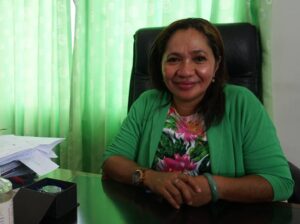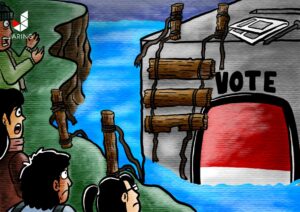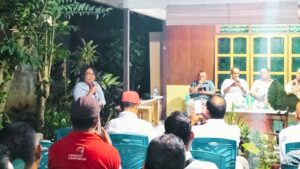Myanmar has finally decided to go ahead with its general elections this year amid the COVID-19 pandemic.
Health and hygiene issues aside, a watchdog has expressed its concerns about the democratic quality of the elections which was conducted on Sunday, Nov. 8.
An independent elections watchdog non-governmental organization called the People’s Alliance for Credible Elections (PACE) said they were concerned about the democratic quality of the elections, which was not only joined by two of the country’s big parties: the Development Party and the National League for Democracy.
This year’s elections in Myanmar was quite massive. About 5,651 candidates from 91 political parties would compete against each other to secure 1,133 legislative seats on the local, regional and national level. Small ethnic group-based political parties also joined forces to get votes from constituents.
Here’s the twist: amid the diversity of parties which joined the elections, the Myanmar Union Elections Commission (UEC) just issued a controversial decision without asking for considerations from competing parties. The UEC has just postponed the elections across 15 small towns in the Rakhine and Syah states, along with 41 small cities, citing security reasons. These areas are mainly populated by minority groups. The decision has costed 1.2 million voters – mostly belonging to minority groups – their voting rights.
Again, most of the voters who lost their voting rights during the elections belonged to minority groups. No wonder the PACE organization was highly concerned. Jaring.id conducted an interview with PACE Director Sai Ye Kyaw Swar Myint on Nov. 5, a few days before the election. Here’s an excerpt from the interview:
Question: What’s the difference between the 2020 elections in Myanmar compared to the 2015 one?
Answer: The 2015 elections was joined by two political parties only: the Union Solidarity and Development Party (USDP) and the National League for Democracy (NLD; the current government). Now is different. There is the NLD, but this time USDP is not the only oppositional party joining the elections; there are lots of ethnic-based political party this time, making the 2020 Elections more “raucous” and sensitive.
This time, the communication lines with the UEC has also been altered. Previously, elections organizers conducted regular meetings with representatives of various elections interest groups. Yet, this time, they rarely open communication lines and instead have shut their doors to everyone. This has made the elections situation even more tense. In addition to that, the COVID-19 pandemic has also altered various foundational regulations of various elections cycles, such as the campaigns. As a consequence, the civil society cannot educate their voters properly, making the 2020 Elections situation even more challenging than before.
You say that this Elections will be highly sensitive; how come?
Recently, the small parties care only about securing their seats. They can no longer lean on big parties; this is why the small parties have coalesced together and feel like they must secure their seats. The results of this year’s elections will be highly important for each political party, turning this into a very sensitive and competitive elections.
How has the UEC prepared itself for the elections so far? Has the commission been able to handle things well or are there other things that they need to pay close attention to?
I believe the 2020 elections has lots of management loopholes. Yet, there are two things that we still need to consider. First: the COVID-19 pandemic has given voting organizers a hard time in training the polling officers. Second: the UEC doesn’t maintain decent communication processes with the political parties and civil society organizations. Furthermore, the UEC also doesn’t consult with these elements of society before they formulate important decisions such as policy changes for elections supervisors locally and abroad, campaign regulations and election data postponement. The lack of consultation process makes for a highly tense situation. Transparency and inclusivity are the main principles of democracy, which are important to create trust and integrity during the elections process.
Besides communication problems, are there other things which have led to this situation?
Basically, communication problems become the biggest issue. When we look at how they formulate their decisions, if only they were willing to include the feedback of political parties and civil society organizations, they could’ve boosted the trust between the commission and the political parties. This exclusionary process is the reason why 26 political parties have refused to sign the campaign code of ethics. This is also the reason why six political parties have refused to conduct their campaign in the state-owned television station due to campaign material censorship policy coined by the UEC.
Give us more details about the elections postponement in some areas of Myanmar populated by minority ethnic groups. What has served as the UEC’s reason to postpone the elections across Myanmar’s 15 small cities and 41 other regions?
Currently, the UEC has postponed the elections across the 15 small cities in the country, comprising nine cities in the Rakhine state as well as six cities in the Shan state. Although the elections have been postponed, there’s still a chance to still reschedule the regional elections within the next five years. Still, some cities postpone the elections in some villages only. These villages, however, won’t be allowed to reschedule their regional elections within the next five years.
The UEC has cited several reasons for postponing the elections in these areas. The primary one is security issues which makes it next to impossible to conduct a free and just elections. For instance: there’s still an ongoing armed conflict in Rakhine which has greatly impacted the area’s security. Worse, the chronic armed conflict has recently escalated. Yet, the UEC did not consult with the local political party when making this decision. This is why a lot of people are dissatisfied with the UEC’s decision.
What has been the impact of this decision to Myanmar’s transition to democracy?
The way that the UEC has made this decision has created lots of suspicions among local political parties. This has put the election organizers’ credibility at stake. Furthermore, the postponement of the elections in the Rakhine state means that half of the state’s entire population has already been denied their voting rights on Nov. 8. We have no idea when they will be able to reschedule the elections over there. This means that their voting rights have been revoked.
As I said before, there’s an ongoing armed conflict in Rakhine. The local political parties and civil society organizations have actually pushed for the commission to just go ahead with organizing the elections in these regions because the conflicting sides in the area still have the potential to solve their conflicts peacefully. However, by revoking the voting rights of the people in Rakhine, the commission is sure to impact the country’s transition to democracy dramatically. Besides, the postponement, which has basically revoked the voting rights of 1.2 million voters, will also impact the low-level political dynamics across the country.
What’s the percentage of voters who have lost their rights?
About 1 to 2 percent of the total number of voters.
Human Rights Watch believes that Myanmar’s elections cycle has systematically been destroyed. What do you think of this opinion?
People have different definitions of what makes the elections free and just. Besides using the “free and just” as our slogan for the elections, we have also attempted to measure just how transparent, inclusive and accountable the elections process is. How well do people trust the local elections commission and the political parties?
Yet again, when we think about democratic principles, the 2020 elections design has lots of weaknesses. These weaknesses, however, cannot justify annulling the elections [in some of the states’] political process.
Regarding the pandemic: is it true that the number of people tested positive [for coronavirus] have continued to increase up to this day?
True, I’m worried about this. Judging from my personal experience on how the UEC failed to manage the preliminary elections properly, whereby several low-level elections commission conducted their health protocols well while others didn’t, I’m anxious that after the elections, the infection rate will soar sharply.
So far, has Myanmar found new COVID-19 pandemic clusters associated with the elections?
We haven’t found these things recently. We, however, have received reports that some of the additional elections security guards, along with some lower-level elections commission members, have been infected with the coronavirus.
How does the pandemic situation affect voter turnout?
As long as we can guarantee voters’ safety, voters will go out to vote. Yet, we need to come up with clear instructions and conduct our due diligence to make sure this happens. Otherwise, I’m quite concerned that the participation rate will decline this year. According to a survey we conducted in the beginning of August 2020, when the COVID-19 infection rates were still lower than today, only 45 percent of our respondents said they would use their voting rights. This has become something which has made us anxious.
How does the elections organizers educate the voters on health safety protocols during the voting process?
The COVID-19 pandemic has been going on for months and the public has no doubt gained some understanding about the importance of wearing face masks and maintaining physical barriers. Yet, the question is: should people come in droves to vote during the D-day, creating long queues, will the voting officers still be able to implement the coronavirus contraction prevention measures properly?
When we look at the political campaign activities which have been conducted during the last two months, the crowds which come to the process exceed the maximum number of 50 individuals set by the Health Ministry. How on Earth will the voting officers make sure these people comply with the health and hygiene safety protocol during COVID-19 in the polling booths? I’m so concerned.
Will the polling stations provide COVID-19 pandemic prevention kits to voters and officer?
Yes, they have provided face masks and hand sanitizers. Yet, our polling stations are quite large: with minimum capacity of 300 voters and maximum 1,500. They try to mitigate the risks using various reasons but doing so will in fact be extremely difficult because that will require voting officers to make sure they observe various things. How will they observe physical distancing at the same time when they also have to supervise the voting process?
Related to the survey which you’ve conducted, are the voters quite enthusiastic about the voting process this year?
Based on a survey we conducted in early August 2020, we find that 45 percent of the respondents say they will still cast their vote. About 35 percent, meanwhile, say they’re interested to cast their vote yet are still undecided whether they will go to the polling stations or not. The rest has decided not to vote. We’ve also been quite worried about the COVID-19 pandemic, which has made it very hard for us to predict people’s level of participation in the elections.
What still needs to be done in Myanmar to make sure its elections are conducted in a free and just manner?
In the long run, we still need to change lots of regulations because a lot of old regulations have turned obsolete. Yet, this time, we’ve seen lots of errors and mistakes in terms of electoral management. We still need to make sure that the elections will run smoothly as we have only a few days left before the voting process. By handling the voting cycle well, the commission can boost public trust to the electoral process.
The commission needs to continuously train the voting officers to make sure these officers understand the entire process well and can conduct it by sticking to the rules. They also need to guarantee the safety of voters. The voting commission also has to ensure the transparency of the entire voting process for each political party. Transparency covers how the commission count the votes and determine the validity of the votes during the voting process. We believe that it’s highly important for us to manage the elections process well this time. Once the commission has been able to manage the process well, all political parties will trust the whole elections process.
How about the voters themselves?
They also need to use the voting rights wisely because this is important for the democratic process. They also need to make sure they travel safely to the polling booths.







